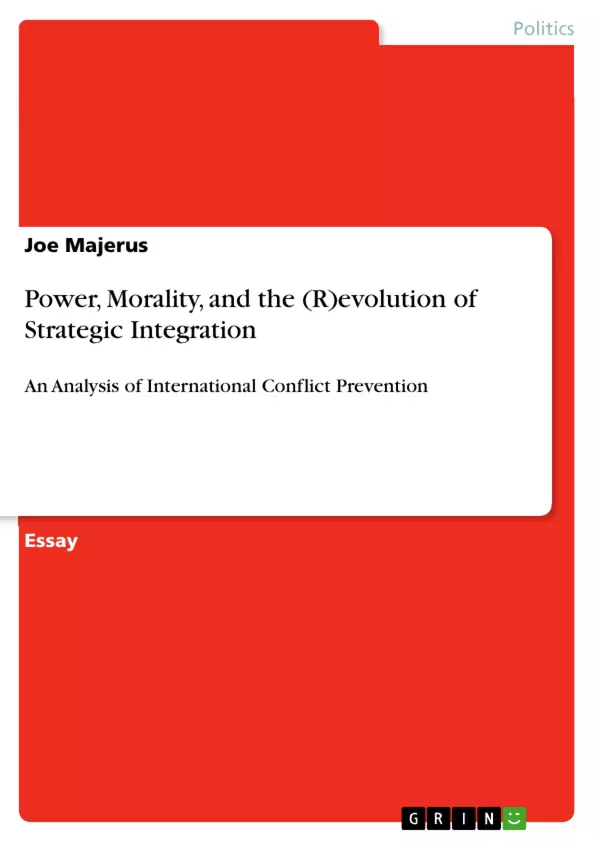The concept of pre-emptive strategic integration is altogether not only one of the most farsighted and multi-faceted instruments available in the fields of strategic peace-building and conflict prevention, but in the long run arguably the most crisis-proof and efficacious one as well. Specifically, a well-considered integrative approach to early conflict pre-emption will be shown to be infinitely more profitable and efficient than protracted conflict resolution processes due to the fact that it after all not only seeks to eliminate the underlying causes of potential security threats to the wider international community from the very beginning, but above all as it likewise more consistently attempts to identify and accommodate the correlative character and transnational implications of initially disjointed occurrences and events, be it in terms of intra-state warfare, religious terrorism, popular resistance and civilian disobedience, governmental instability and dictatorial oppression, genocide and human rights violations, economic dislocation and trade imbalances, humanitarian catastrophes, environmental disasters, or mass refugee and migration movements.
Inhaltsverzeichnis (Table of Contents)
- Context and Literature
- Strategic Integration in International Politics
Zielsetzung und Themenschwerpunkte (Objectives and Key Themes)
This work explores the concept of strategic integration as a means of preventing international conflict. It examines how international society can proactively address the root causes of conflict, rather than reacting to crises after they erupt.
- The importance of strategic integration for international peace and security
- The role of various power types (hard, soft, smart, and structural power) in conflict prevention
- The challenges of achieving effective strategic integration in a globalized world
- The need for a shift from reactive to proactive conflict management strategies
- The potential of strategic integration to address a range of contemporary threats, including terrorism, resource depletion, and nuclear proliferation
Zusammenfassung der Kapitel (Chapter Summaries)
Context and Literature
This chapter provides a background overview of the concept of strategic integration, drawing on key literature in the fields of conflict prevention, peace-building, globalization, and international relations. It highlights the theoretical foundations and key thinkers associated with strategic integration, exploring ideas such as complex interdependence, functionalism, and the "English School."Strategic Integration in International Politics
This chapter examines the contemporary international context and the challenges it presents for conflict prevention. It argues that while the international community possesses the capacity to intervene in conflicts, it often fails to prevent them effectively. The chapter explores the various forms of threats and conflicts facing the international system, ranging from terrorism and resource depletion to nuclear proliferation and state fragility. It highlights the need for a more proactive and integrated approach to addressing these threats, moving beyond reactive responses.Schlüsselwörter (Keywords)
The primary focus of this work is on the concept of strategic integration, its application in international conflict prevention, and the various power dynamics involved. Key themes include international security, conflict resolution, globalization, soft power, smart power, structural power, and the challenges of global governance in the 21st century.
Frequently Asked Questions
What is pre-emptive strategic integration?
It is a proactive approach to conflict prevention that seeks to eliminate the root causes of security threats before they escalate into crises.
Why is strategic integration considered more efficient than conflict resolution?
Because it addresses transnational implications and underlying causes early on, avoiding the high costs and human suffering associated with protracted warfare and humanitarian disasters.
What types of global threats can this approach address?
It can be applied to religious terrorism, governmental instability, genocide, economic dislocation, environmental disasters, and mass migration movements.
What role do different types of power play in conflict prevention?
The work examines the use of hard, soft, smart, and structural power to proactively manage international security and foster peace-building.
What theoretical foundations are used in this study?
The research draws on concepts like complex interdependence, functionalism, and the "English School" of international relations.
- Quote paper
- Joe Majerus (Author), 2016, Power, Morality, and the (R)evolution of Strategic Integration, Munich, GRIN Verlag, https://www.grin.com/document/433426



